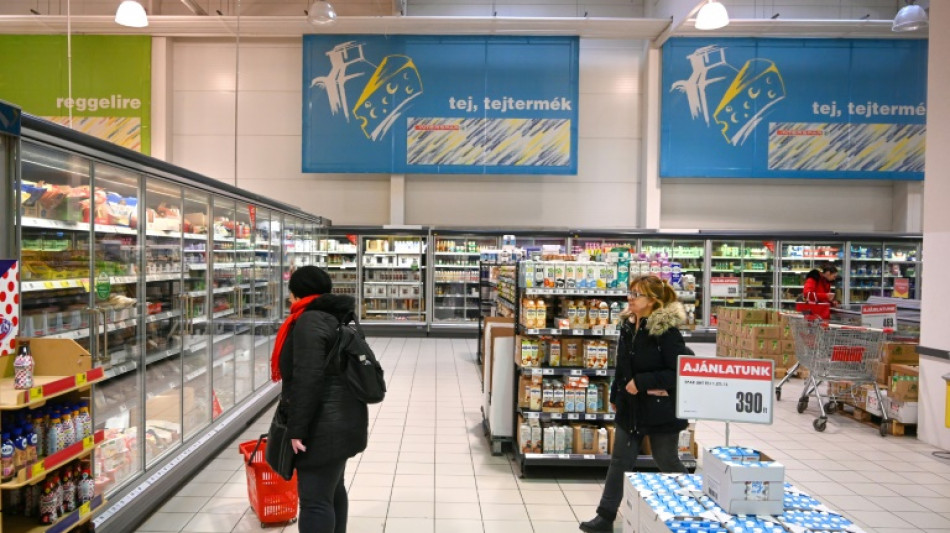
-
 Gaza civil defence describes medic killings as 'summary executions'
Gaza civil defence describes medic killings as 'summary executions'
-
Francis: radical leader who broke the papal mould
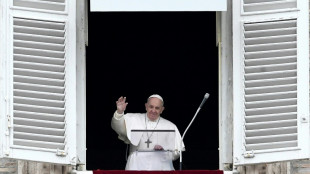
-
 Oscar stars, Max keeps mum, Sainz alive - Saudi GP talking points
Oscar stars, Max keeps mum, Sainz alive - Saudi GP talking points
-
Iyer, Kishan win back India contracts as Pant's deal upgraded

-
 Vance lands in India for tough talks on trade
Vance lands in India for tough talks on trade
-
Inside South Africa's wildlife CSI school helping to catch poachers

-
 Nigerian Afrobeat legend Femi Kuti takes a look inward
Nigerian Afrobeat legend Femi Kuti takes a look inward
-
Kim Kardashian: From sex tape to Oval Office via TV and Instagram

-
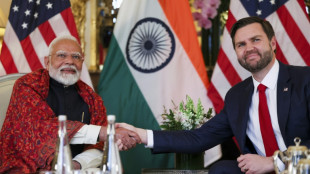 Vance in India for tough talks on trade
Vance in India for tough talks on trade
-
Thunder crush Grizzlies as Celtics, Cavs and Warriors win

-
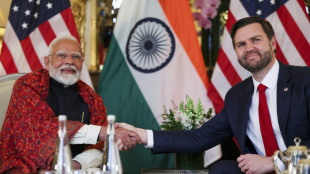 Vance heads to India for tough talks on trade
Vance heads to India for tough talks on trade
-
China slams 'appeasement' of US as nations rush to secure trade deals
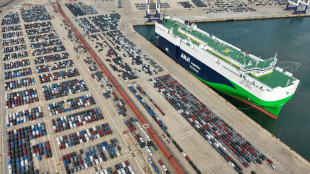
-
 'Grandpa robbers' go on trial for Kardashian heist in Paris
'Grandpa robbers' go on trial for Kardashian heist in Paris
-
Swede Lindblad gets first win in just third LPGA start

-
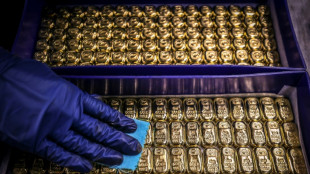 Gold hits record, dollar drops as tariff fears dampen sentiment
Gold hits record, dollar drops as tariff fears dampen sentiment
-
As Dalai Lama approaches 90, Tibetans weigh future

-
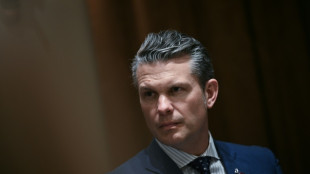 US defense chief shared sensitive information in second Signal chat: US media
US defense chief shared sensitive information in second Signal chat: US media
-
Swede Lingblad gets first win in just third LPGA start

-
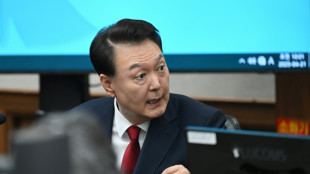 South Korea ex-president back in court for criminal trial
South Korea ex-president back in court for criminal trial
-
Thunder crush Grizzlies, Celtics and Cavs open NBA playoffs with wins

-
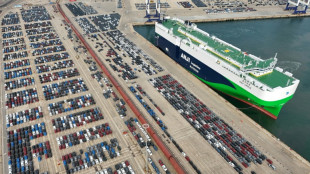 Beijing slams 'appeasement' of US in trade deals that hurt China
Beijing slams 'appeasement' of US in trade deals that hurt China
-
Trump in his own words: 100 days of quotes
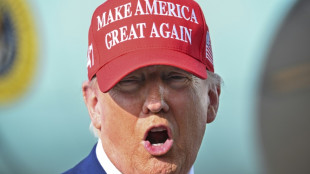
-
 Padres say slugger Arraez 'stable' after scary collision
Padres say slugger Arraez 'stable' after scary collision
-
Trump tariffs stunt US toy imports as sellers play for time
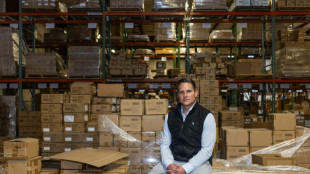
-
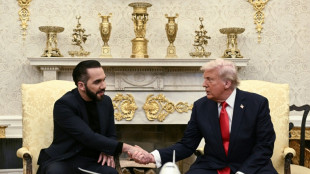 El Salvador offers to swap US deportees with Venezuela
El Salvador offers to swap US deportees with Venezuela
-
Higgo holds on for win after Dahmen's late collapse

-
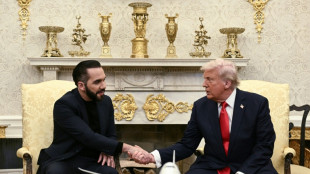 El Salvador's president proposes prisoner exchange with Venezuela
El Salvador's president proposes prisoner exchange with Venezuela
-
Gilgeous-Alexander, Jokic, Antetokounmpo named NBA MVP finalists

-
 Thomas ends long wait with playoff win over Novak
Thomas ends long wait with playoff win over Novak
-
Thunder rumble to record win over Grizzlies, Celtics top Magic in NBA playoff openers

-
 Linesman hit by projectile as Saint-Etienne edge toward safety
Linesman hit by projectile as Saint-Etienne edge toward safety
-
Mallia guides Toulouse to Top 14 win over Stade Francais

-
 Israel cancels visas for French lawmakers
Israel cancels visas for French lawmakers
-
Russia and Ukraine trade blame over Easter truce, as Trump predicts 'deal'

-
 Valverde stunner saves Real Madrid title hopes against Bilbao
Valverde stunner saves Real Madrid title hopes against Bilbao
-
Ligue 1 derby interrupted after assistant referee hit by projectile

-
 Leclerc bags Ferrari first podium of the year
Leclerc bags Ferrari first podium of the year
-
Afro-Brazilian carnival celebrates cultural kinship in Lagos

-
 Ligue 1 derby halted after assistant referee hit by projectile
Ligue 1 derby halted after assistant referee hit by projectile
-
Thunder rumble with record win over Memphis in playoff opener

-
 Leverkusen held at Pauli to put Bayern on cusp of title
Leverkusen held at Pauli to put Bayern on cusp of title
-
Israel says Gaza medics' killing a 'mistake,' to dismiss commander

-
 Piastri power rules in Saudi as Max pays the penalty
Piastri power rules in Saudi as Max pays the penalty
-
Leaders Inter level with Napoli after falling to late Orsolini stunner at Bologna

-
 David rediscovers teeth as Chevalier loses some in nervy Lille win
David rediscovers teeth as Chevalier loses some in nervy Lille win
-
Piastri wins Saudi Arabian Grand Prix, Verstappen second

-
 Kohli, Rohit star as Bengaluru and Mumbai win in IPL
Kohli, Rohit star as Bengaluru and Mumbai win in IPL
-
Guirassy helps Dortmund past Gladbach, putting top-four in sight

-
 Alexander-Arnold lauds 'special' Liverpool moments
Alexander-Arnold lauds 'special' Liverpool moments
-
Pina strikes twice as Barca rout Chelsea in Champions League semi


Orban's food price cap takes aim at foreign retailers in Hungary
Seeking to tame public anger over soaring inflation, Hungarian Prime Minister Viktor Orban has imposed price controls on basic food items sold in supermarkets, renewing his fight against multinational companies.
Economists say the measure may bring short-term relief to consumers, but it provides little help to many in rural areas who live far from bigger towns where large retailers are located.
"Small stores are not affected, only big multinationals, and we don't go there," said retiree Erzsebet Risztics, 68, who lives in Tiszaroff, a village in one of the Central European country's poorest regions.
Risztics, who has diabetes, can also no longer afford low-sugar food items she needs "because they've gotten terribly expensive", and sparse bus services keep her from shopping in surrounding towns.
Another retiree, 80-year-old Erzsebet Forgo, said: "It hurts that the village is left out" of the price controls.
Inflation has roared back in Hungary, reaching 5.7 percent in February, the highest level in the 27-nation European Union. By comparison, consumer prices rose by 2.7 percent on average across the EU.
In mid-March, Orban, who faces elections next year, introduced a measure capping supermarket markups on 30 basic food items at 10 percent above wholesale costs.
The measure -- which includes foods like eggs, milk, and meats -- exempts retailers with smaller annual revenues, de facto sparing local grocers.
- 'Plundering' Hungarians -
Shortly after the measures went into effect, Orban accused foreign retailers of "plundering Hungarians" with their "excessive and unjustified price rises".
Alleging margins of 42 percent on chicken wings or 70 percent on yogurts, Orban said the "emergency intervention" was designed to rein in retailers which "only care about profit".
Since his return to power in 2010, the nationalist leader has repeatedly railed against large international retail chains that began flourishing after the fall of Communism, sidelining less-competitive Hungarian grocers.
In recent years, the Hungarian state has rolled out measures penalising multinational companies, while pouring taxpayers' money into economic sectors like banking and telecoms. Some of those sizeable domestic firms were subsequently sold to people close to Orban.
But with big European chains like SPAR, Lidl and Tesco dominating Hungary's retail sector, the government resorted to introducing protectionist measures, including a tax on superprofits as well as temporary price caps.
Last year, Austrian supermarket chain SPAR accused the Hungarian government of discriminating against foreign companies, with an EU top court ruling in its favour in a separate case.
- Opposite effect -
The Hungarian Trade Association, which represents many of the country's top retailers, rejected the government's accusations of profiteering.
The group says profits have been dwindling or turned into losses, with multinationals having to pay a sales tax, unlike their smaller Hungarian rivals.
At SPAR, the price controls are expected to result in an additional monthly burden of about 3.7 million euros (nearly $4 million), according to financial news site Portfolio, citing an internal e-mail.
Gabriella Heiszler, the head of SPAR's Hungarian subsidiary, warned of drastic measures such as potential layoffs "if the current regulatory environment does not improve".
Economists warn that retailers might raise prices on other food items to make up for lost revenues, ultimately producing the opposite effect.
"Initially, it could curb inflation, because it is a wide range of products," David Nemeth, lead analyst at K&H Bank told AFP.
Orban had imposed similar price caps in 2022 and 2023, when inflation had soared to as high as 26 percent in the wake of Russia's invasion of Ukraine.
Nemeth said the latest measures would -- just like the previous one -- "boost inflation" in the long-term, with prices likely to be increased once the caps are phased out, he added.
According to Eurostat, Hungary, alongside Bulgaria, ranked last in household consumption within the EU in 2023.
Rozalia Patak, an unemployed mother of five, hopes the price controls will make life a bit easier.
In her hunt for good deals, she sometimes takes a bus to a nearby city to get hold of the "cheapest pasta" there.
"Everything is so expensive. We can't afford salami or fish," said the 51-year-old, who now collects plastic bottles to make a bit of cash on the side.
J.Sauter--VB
